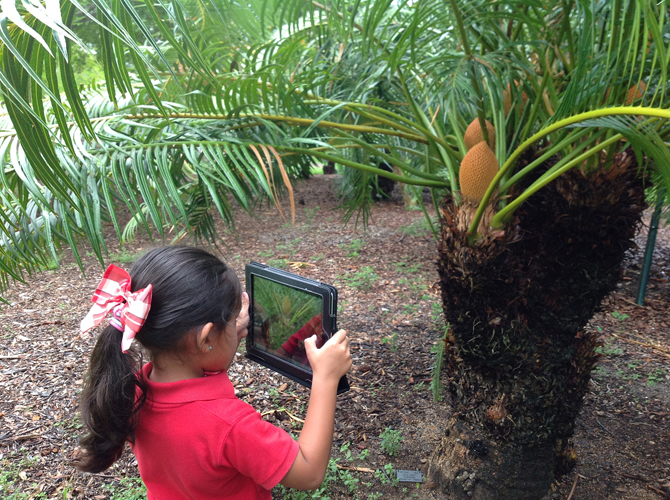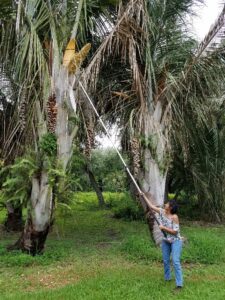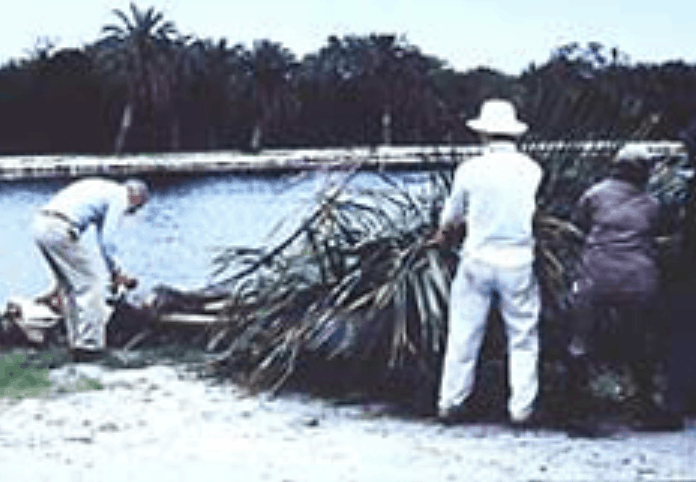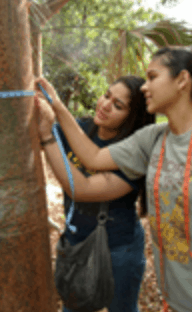As a 24-hour-a-day functioning outdoor scientific laboratory, MBC is open by appointment to scientists, educators, students, historians, botanical groups, and all others interested in scientific plant collections.
A wide range of educational opportunities are found at the Montgomery Botanical Center. Our scientific plant collections have tremendous educational value. We host students, teachers, classes, members of plant societies and botanical groups, as well as all others interested in scientific plant collections.
Biology and botany classes come to study our cultivated collections as well as the five types of native plant communities here. Each year, university geology students research the Silver Bluff Limestone Escarpment that extends the length of our property. Tropical botany classes through the University of Florida and Harvard University use MBC’s collections as a living laboratory each summer.
Plant-focused Learning
Montgomery Botanical Center is open by appointment to students, educators, scientists, historians, botanical groups, and all others interested in scientific plant collections (please see contact information at bottom of page). Groups visit MBC to learn about its plant collections, collections planning, plant mapping and survey procedures, and landscape architecture.
Independent Study
Montgomery Botanical Center hosts students, teachers, and classes interested in MBC’s scientific plant collections. MBC cooperates with colleges and universities, making its plant collections, knowledge, and expertise available to students and educators. MBC is a 24-hour-a-day laboratory and classroom for biology and tropical botany classes, for example.
Lectures, Seminars, and Workshops
Montgomery Botanical Center also educates the community about its scientific and conservation work through lectures, seminars, and workshops focusing on its palm and cycad collections.
Researchers visit our collections to strengthen their knowledge of palms and cycads; to begin long- term studies of specific species; and to collect material to take back to their laboratories for research or use for teaching. These visiting researchers, along with Montgomery Botanical Center staff, share their findings with the community through lectures, seminars, and workshops.
Educational Institutions that have leveraged Montgomery Botanical Center’s botanical capital include:
- City University of New York
- Colorado State University
- Columbia University
- Florida International University
- Harvard University
- Humboldt State University
- James Cook University, Australia
- Louisiana State University
- Miami Dade College
- Texas A&M University
- University of British Columbia
- University of California, Davis
- University of California, Riverside
- University of Florida
- University of Guam
- University of Miami
- University of Missouri
- University of New Mexico
- University of New Orleans
- University of Puerto Rico
- University of South Florida
- Williams College, Massachusetts

The Montgomery Botanical Center is committed to supporting the student of botany in its broadest definition.

Montgomery Botanical Center supports education in many ways. One of our most successful programs is our internship program.









Summer Botanical Associate
at the Montgomery Botanical CenterAre you interested in working as a Summer Botanical Associate at Montgomery Botanical Center? We are currently accepting applications from undergraduates (or recent graduates) for two internship positions, supported by the Peter R. & Stuart Y. Jennings Internship Fund and Robert K. Zuck & Peter R. Jennings Internship Fund. These paid internships are designed to inspire exceptional students into botanical careers and provide real-world experience to upcoming plant scientists, who work independently and with garden staff on research projects and learn about botanical garden horticulture.
Montgomery Botanical Center (MBC) is a non-profit botanical research garden established in 1959 and located in Coral Gables, Florida (Miami-Dade County). Focused on palms and cycads, the garden’s population-based, documented, scientific collections are mainly derived from wild-collected specimens and provide myriad opportunities for research and investigation.
Internships require a commitment of at least 20 hours per week during the summer months. To apply, please submit (1) a letter of interest describing your research interests, relevant experience in botany and/or ecology, and availability over the summer, (2) CV or resume, (3) one letter of recommendation, and (4) contact information for two additional references.
Applications and inquiries should be emailed to MBC’s Living Collections Manager & Botanist, Dr. Joanna Tucker Lima, at joannat@montgomerybotanical.org. Deadline: March 13, 2024
Please visit our website for more information about MBC at www.montgomerybotanical.org. Below is a list of potential research projects. Other research ideas are always welcome.
Potential Research Projects at MBC:
- Horticulture/nursery studies (e.g., fertilization, irrigation, IPM, soil media, seed germination, etc.)
- Reproductive biology and pollination ecology
- Parthenocarpy in palms
- Cycad cone and pollen collection, hand pollination, and seed viability studies
- Thermogenesis in palm flowering
- Cycad or palm leaf anatomy
- Chemical ecology of palm flowers and their pigments
- Herbarium voucher collection and archival study of plant distributions

Contact Dr. Joanna Tucker Lima to



In March 2008, Montgomery Botanical Center hosted an Environmental Immersion Day for students from John A. Ferguson Senior High School as a part of the Fairchild Challenge environmental education program.


Field Trips put science right into your students hands.


Community & Higher Education
at the Montgomery Botanical CenterMontgomery also regularly hosts college level classes and professional seminars.

You won’t see this at most botanical gardens—cutting down a mature plant for classroom study.
In 1999, Harvard University’s Dr. Barry Tomlinson (at left, with the chainsaw) and his students took down this coconut palm at the Montgomery Botanical Center to study its structures in detail.
























